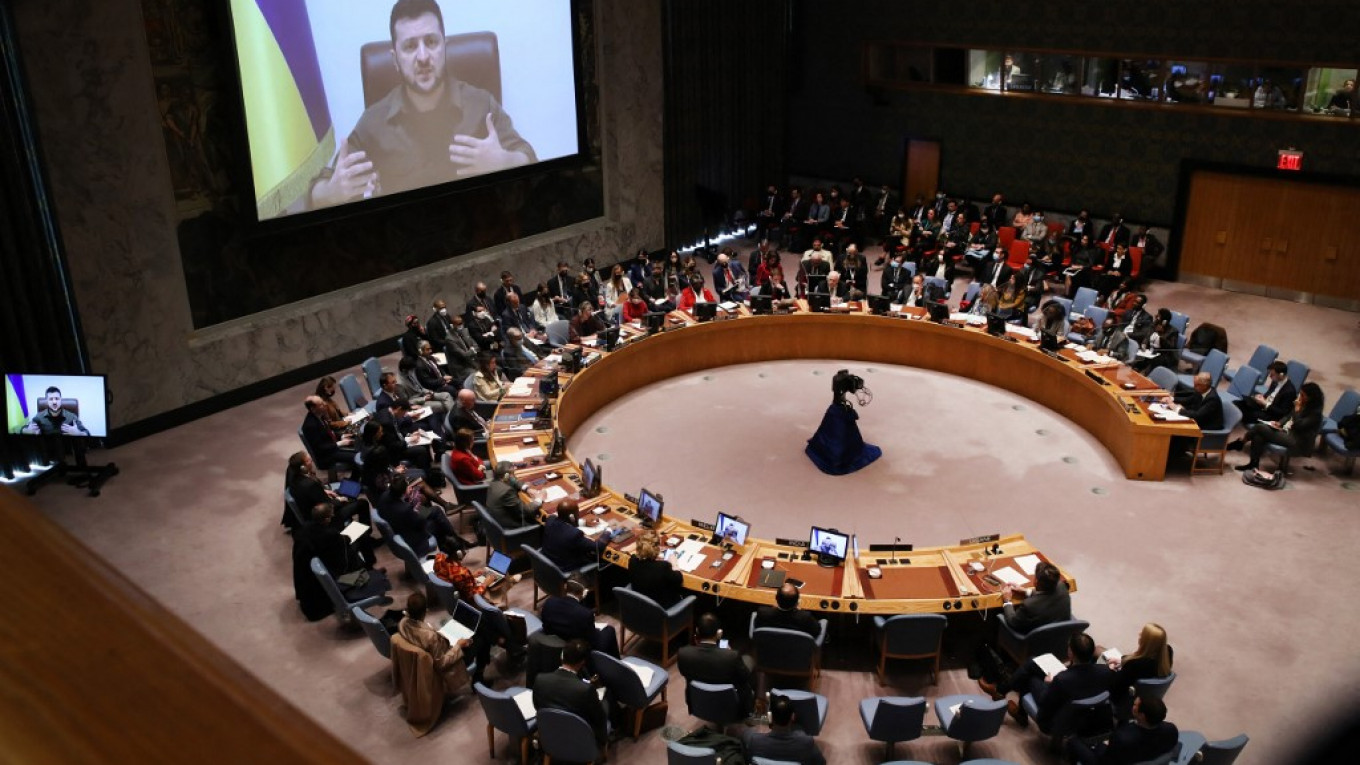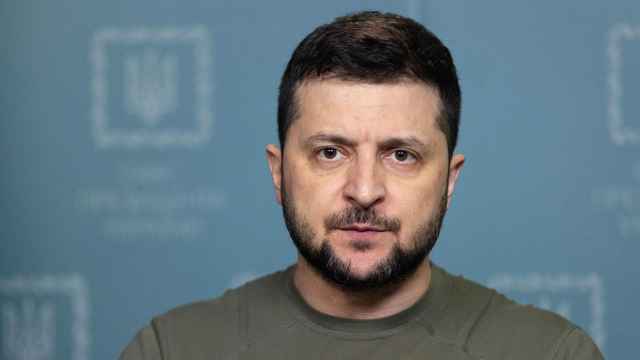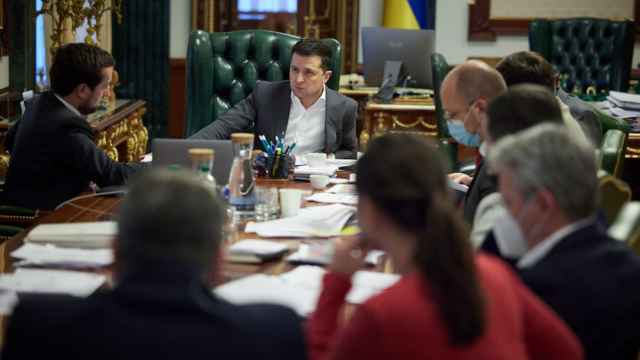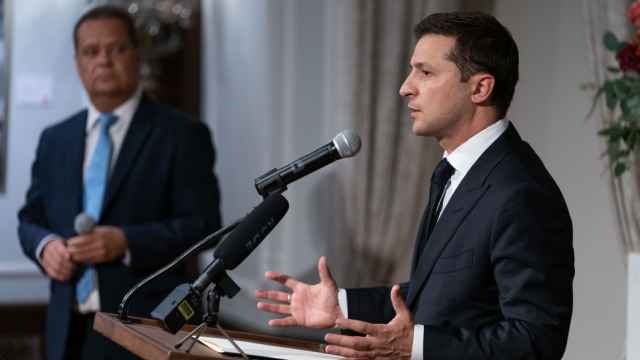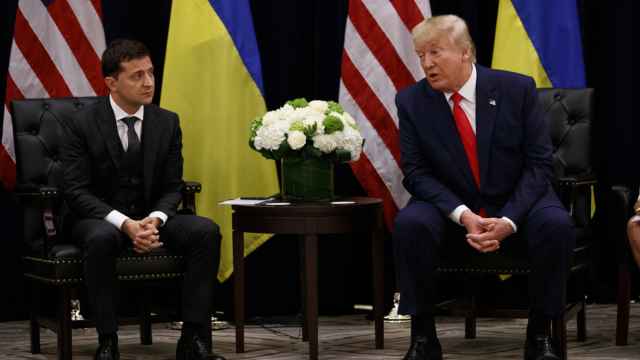Western powers were readying new sanctions against Russia on Wednesday after Ukraine's president called for tougher action and accused Moscow of atrocities during the six-week war.
The measures follow an international outcry over hundreds of civilians found dead in areas from which Russian troops have withdrawn around Ukraine's capital, including the town of Bucha.
In a video address to the UN Security Council on Tuesday, Ukrainian leader Volodymyr Zelensky showed harrowing images of corpses — including of children — that he said were victims of Russian atrocities.
"They cut off limbs... slashed their throats. Women were raped and killed in front of their children," he said, after earlier comparing Russia's assault to the 1937 Nazi bombing of the town of Guernica.
The Kremlin has denied any civilian killings, claiming the images emerging from Bucha and other sites are fakes produced by Ukrainian forces, or that the deaths occurred after Russian soldiers pulled out.
Zelensky called for Russia's exclusion from the UN Security Council, where it is one of five members with veto power, saying it was blocking the UN from carrying out "the functions for which it was created."
On Wednesday, Pope Francis — who has repeatedly called for peace, while not naming Russia or President Vladimir Putin — also deplored the "powerlessness of international organizations."
At his weekly audience at the Vatican, the 85-year-old pontiff kissed a flag he said had come from "that martyred city Bucha," condemning "ever more horrendous cruelties" in Ukraine.
The UN General Assembly announced later it would vote Thursday on suspending Russia from the body's Human Rights Council, after moves by the U.S. and Britain to have it excluded.
Push to isolate Moscow
Thousands of people have been killed and more than 11 million displaced as refugees or within Ukraine since Russia's invasion on Feb. 24.
Western powers have already pummelled Russia with debilitating economic sanctions, which forced Moscow Wednesday to make foreign debt payments on dollar-denominated bonds in rubles.
But the killings in Bucha and elsewhere have galvanized support for Kyiv, with Washington announcing another $100 million in military aid, and produced new momentum for additional sanctions on Moscow.
Washington, in coordination with the G7 and the European Union, is expected on Wednesday to announce measures including a ban on all new investments in Russia.
"You can expect... that they will target Russian government officials, their family members, Russian-owned financial institutions, also state-owned enterprises," White House Press Secretary Jen Psaki told a briefing on Tuesday.
The EU meanwhile was poised to implement a fifth round of sanctions cutting off Russian coal imports -- and European Council chief Charles Michel said that "sooner or later," it must also impose oil and gas sanctions.
Condemning "war crimes" in Russia, he said: "There must be, and there will be, severe consequences for all those responsible."
But addressing the Irish parliament Wednesday, Zelensky condemned the "indecisiveness" on the part of EU nations, which are dependent on Russian energy.
"We still need to convince Europe that Russian oil cannot feed the Russian military machine with new sources of funding," Zelensky added, calling also for the total exclusion of Russian banks from Western finance.
In Britain, which says it has so far frozen some $350 billion in assets from Putin's "war chest," Prime Minister Boris Johnson said what happened in Bucha "doesn't look far short of genocide to me."
He said the international community "will be moving again in lockstep to impose more sanctions and more penalties on Vladimir Putin's regime."
In other moves to isolate Moscow, a string of EU countries including Germany, France, Italy and Spain have expelled more than 200 Russian diplomats and staff between them this week.
The Kremlin called the mass expulsions a "short-sighted move" that would complicate efforts to negotiate an end to the hostilities.
Putin also warned of "reprisals" for recent European measures targeting Russian gas giant Gazprom — and said Moscow would "monitor" its food exports to "hostile" nations, raising the specter of shortages and price spikes.
Kremlin denials
At the Security Council meeting, Moscow's ambassador rejected Zelensky's claims, saying the "ungrounded accusations... are not confirmed by any eyewitnesses."
But satellite photos taken while Bucha was still under Moscow's control show what appear to be bodies lying in streets where the dead were later found by Ukrainian forces and seen by journalists.
And multiple Bucha residents told AFP they had seen Russian soldiers killing civilians.
"Right in front of my eyes, they fired on a man who was going to get food at the supermarket," said 43-year-old Olena, who declined to give her family name.
During a grim cleanup, the remains of partially burned bodies in black bags were lifted into a van, with officials telling journalists "dozens of bodies" remained in apartments and in nearby woods.
European Commission chief Ursula von der Leyen, who will visit Kyiv this week, has offered the bloc's assistance in documenting proof of war crimes.
Cluster bombs
Ukrainian authorities have warned that other areas may have suffered even worse fates than Bucha.
Scenes of devastation have met those venturing into areas from which Russian forces have withdrawn.
In the northern city of Chernigiv, which was besieged from the early days of the invasion, a charred children's hospital, full of bullet and shrapnel holes, served as a shelter.
In the dank basement, children painted on walls — tiny handprints, a smeared rainbow, a fluttering Ukrainian flag.
"Cluster bombs were flying, we have traces of these bombs," said 51-year-old Olena Makoviy. "The injured were brought to the children's hospital, both adults and children."
City officials estimate around 350 civilians have been killed in Chernigiv, with fellow residents digging mass graves to bury them.
"It was very scary here from the first days of the war," said Makoviy. "They brought guys, handsome, young, but no longer alive."
'We are ready'
The Russian withdrawal from areas around Kyiv and the north is part of a shift of focus towards Ukraine's southeast, in a bid to create a land bridge between occupied Crimea and Moscow-backed separatist statelets in Donbas.
NATO chief Jens Stoltenberg said the alliance expects a Russian push in "coming weeks" to try to seize the entire Donbas.
"We know the Russians are reinforcing and are getting ready to attack," a senior Ukrainian officer in the village of Krasnopillia told AFP.
"We are ready... we've planned some surprises for them along the way."
Civilians have been asked to evacuate west and on Tuesday a line of cars stretching three kilometers was waiting to pass a checkpoint, while thousands of other residents boarded trains to leave.
Russian strikes on Wednesday killed at least two people and wounded five others near a humanitarian distribution point in the east Donetsk region, the regional governor said.
Meanwhile shells and rockets were landing at regular intervals in the industrial city of Severodonetsk, the easternmost city held by Ukrainian forces on the eastern frontline.
Peace talks between the sides have so far gone nowhere, though Moscow says it is "ready" to continue.
Ukraine has proposed an agreement where other countries would guarantee its security in return for Kyiv accepting a neutral and non-nuclear status, not joining NATO and refusing to host foreign military bases.
The proposal would also see Russia accept Kyiv joining the European Union.
A Message from The Moscow Times:
Dear readers,
We are facing unprecedented challenges. Russia's Prosecutor General's Office has designated The Moscow Times as an "undesirable" organization, criminalizing our work and putting our staff at risk of prosecution. This follows our earlier unjust labeling as a "foreign agent."
These actions are direct attempts to silence independent journalism in Russia. The authorities claim our work "discredits the decisions of the Russian leadership." We see things differently: we strive to provide accurate, unbiased reporting on Russia.
We, the journalists of The Moscow Times, refuse to be silenced. But to continue our work, we need your help.
Your support, no matter how small, makes a world of difference. If you can, please support us monthly starting from just $2. It's quick to set up, and every contribution makes a significant impact.
By supporting The Moscow Times, you're defending open, independent journalism in the face of repression. Thank you for standing with us.
Remind me later.


